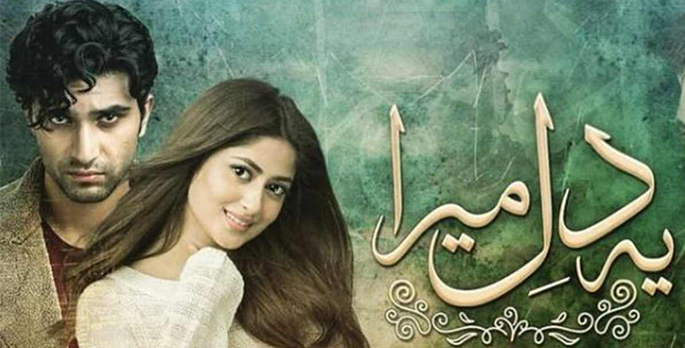Ever since MD Productions announced Sahad’s return to television screens with Ye Dil Mera following the hit Yakeen Ka Safar, excitement levels of their ardent fans hit a new high. The project had it all — a stellar team helmed by top-billed director Ahson Talish and celebrated writer Farhat Ishtiaq penning the script.
Therefore it comes as no surprise that the buzz surrounding the play was massive. Did all the hype actually result in a satisfying payoff for the audience? The answer is complicated. Despite a decent start, recent episodes of Ye Dil Mera seem to be slackening in terms of pace and plot development, and Sajal Aly and Ahad Raza Mir’s famed chemistry has so far not quite materialized in the manner that fans had been expecting.
Leaving the viewers puzzled
As viewers of the serial would know, Ahad and Sajal play Amaan and Noor-ul-Ain respectively, both having lived through an undisclosed trauma in the past. Adnan Siddiqui as Agha Jaan is Noor-ul-Ain’s overprotective father who seems to have a shadowy history of his own.
In a scene from Episode 5 we see Amaan and Noor having a Facebook chat and going by the expressions of the two, it seems to be a romantic chat and the two seem to be invested in each other — especially Noor. Shockingly, in their very next interaction, Noor doesn’t even feel comfortable sharing a lift with Amaan and instead tries to call her father to escort her. While it is implied that Sajal’s character (and possibly Ahad’s too) is suffering from a mental illness, such bizarre interactions happen quite a few times – enough for them to lose their impact, and the audience which is looking for their favorite couple to rock the screen in-turn feels disoriented, with the romantic pay-offs simply not happening.
The play started on an interesting note with a promise of unexpected twists and intriguing sub-plots. However, as the episodes progressed the writing seems to have run out of steam. The script by Farhat Ishtiaq has some fresh ideas but does not seem to be doing justice to the enormous talents of Ahad and Sajal, who are a power couple in their own right. The likeability factor for their characters is missing here.
Are the characters likeable?
Amaan’s character is a mystery to the viewers so far, as are his intentions towards Noor. This is made amply clear by a scene from Episode 6, where we see Noor having a breakdown of sorts in the lift after experiencing claustrophobia, and subsequent close-up shots highlight Amaan touching Noor in an uncomfortable way while consoling her. Noor, by this time, is on the verge of losing her consciousness. However the inexplicable happens and next, we see Noor writing in her diary that this was her only lift experience in which she didn’t get scared. Now, this doesn’t make much sense, especially for an average Pakistani drama viewer!
 In any successful love story, the audience needs to feel for both the leads. Here, until now Amaan’s character hasn’t really gotten any element of sympathy. Usually, protagonists with gray shades or negative elements are given a backstory or a sub-plot which would make their character click with the audience and get their sympathy. In the serial, the audience simply finds it hard to trust Amaan’s antics. All the time we are left wondering: What exactly is he up to?
In any successful love story, the audience needs to feel for both the leads. Here, until now Amaan’s character hasn’t really gotten any element of sympathy. Usually, protagonists with gray shades or negative elements are given a backstory or a sub-plot which would make their character click with the audience and get their sympathy. In the serial, the audience simply finds it hard to trust Amaan’s antics. All the time we are left wondering: What exactly is he up to?
Sahad Factor
Ahad Raza Mir and Sajal Aly became a hot audience favorite after Yakeen Ka Safar’s surprise success. The two have cultivated a cult following and it was natural for viewers and fans to be super excited for the duo’s comeback on their television screens. They naturally wanted an out and out love-story, along the lines of Yakeen Ka Safar, which had a somewhat low key romantic track between the two.
After Sahad announced their engagement, the audience’s desire to see the two romance in their next performance reached a peak. However, Ye Dil Mera is more of a thriller, with the male protagonist being a doubtful character himself. Missing in action is the romantic interaction and the sizzling chemistry that propelled the two to super-stardom.
The play also has not fully utilized the beautiful locales of Islamabad, with most scenes being shot indoors. On the other hand, Yakeen Ka Safar used the Kashmiri sites to its fullest and made it an integral part of the narrative.
The script doesn’t give ample room for romance and the audience can’t help but wait to root for their favorite couple to share those special moments together as the story progresses. Speaking of which, the storyline too seems to be going downhill with multiple sub-plots taking focus away from the leads. Importantly, the screenplay lacks the grip and pace, two things key for making a romantic thriller work.
Repetitive writing
Watching the play, one gets the feeling that they have seen the characters somewhere before. The leading lady being the apple of her father’s eyes and very close to him is a role similar to what was penned for Maya Ali in Diyar-e-Dil. The dark and mysterious hero angle too has been tried and tested in dramas like Alvida (for Zahid Ahmed’s character) and Kankar (for Fahad Mustafa). Amaan’s character could have been an all-out villainish one to make it more interesting.
Moreover, as the story has progressed, the situations and scenes have become quite repetitive, such as the many sequences between Agha Jaan and Noor where the makers just want to depict how overtly protective the father is about his daughter. All of that registered already in the first episode itself. The dynamics of characters as they interact have not evolved much. Even Ahad and Sajjal’s scenes in the office cabins seem to be monotonous and one-dimensional. Overall, the viewer is left with a sense of deja-vu.
Final Verdict
Ye Dil Mera started on a promising note with a stellar cast, a superlative production house and the past success of Yakeen Ka Safar working in its favor. However, the lackluster writing gives no scope for a soulful romance between the leads which has personally disappointed me as a Sahad fan. The drama lacks the pace and novelty needed to make it work. The inconsistent narrative and multiple sub-plots hinder the grip of this play, which we hope gets better in the coming episodes.




